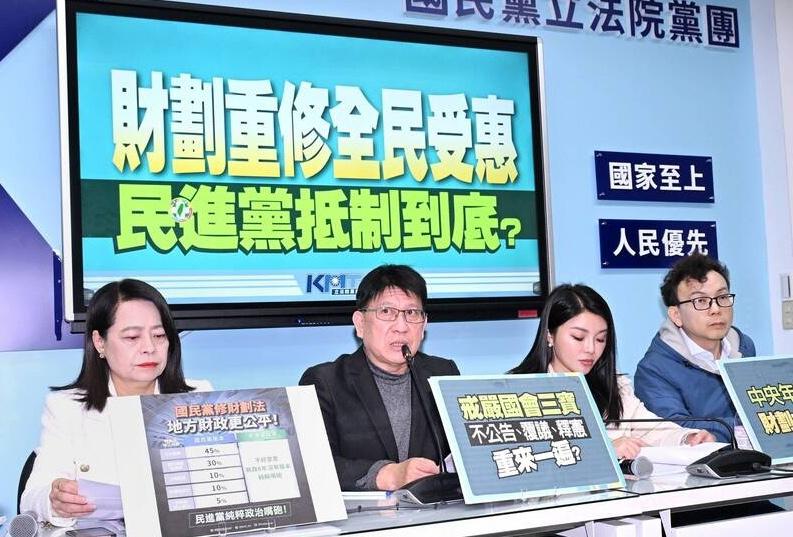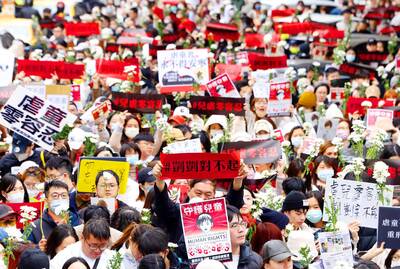The Chinese Nationalist Party (KMT) today defended amendments to the Act Governing the Allocation of Government Revenues and Expenditures (財政收支劃分法) that the Democratic Progressive Party (DPP) said would necessitate an overhaul of next year's general budget.
The amendments, if promulgated into law, would allocate 60 percent of available funding to local governments rather than the current 25 percent, resulting in central government spending power being reduced annually by NT$375.3 billion (US$11.49 billion), according to the Directorate-General of Budgeting, Accounting and Statistics (DGBAS).

Photo: Fang Pin-chao, Taipei Times
At a news conference, KMT caucus Secretary-General Lin Szu-ming (林思銘) rejected claims made earlier in the day by government ministers that the revisions, which cleared the legislature on Friday last week following brawls between lawmakers, would harm central government spending on defense, social welfare and other major programs.
Lin suggested that the reallocation of funding would instead reward fiscally responsible local governments and encourage them to promote economic development and create jobs, rather than relying on central government handouts.
"When President William Lai (賴清德) was mayor of Tainan, he called for amendments to the Act Governing the Allocation of Government Revenues and Expenditures," Lin said, suggesting that the DPP also sought greater funds for local governments when it previously was in opposition.
"Basically, what [for them] was right yesterday is wrong today," Lin said. "They changed places and changed their minds."
The KMT news conference — titled "The funding allocation overhaul will benefit everyone: Will the DPP resist endlessly?" — took place on the same day the DPP caucus held its own news conference titled "The sinister funding allocation amendments will harm everyone."
At a separate news conference today, DGBAS Minister Chen Shu-tzu (陳淑姿) said that the changes would cause "procedural chaos" in relation to next year's general budget, which has already been hotly contested by lawmakers.
The minister also said that the central government would lose NT$375.3 billion, or 9 percent of its total revenue, if the law goes into effect.
This would necessitate massive reductions in spending, Chen said, including cuts for defense equivalent to 28 percent.

Taiwan yesterday condemned the recent increase in Chinese coast guard-escorted fishing vessels operating illegally in waters around the Pratas Islands (Dongsha Islands, 東沙群島) in the South China Sea. Unusually large groupings of Chinese fishing vessels began to appear around the islands on Feb. 15, when at least six motherships and 29 smaller boats were sighted, the Coast Guard Administration (CGA) said in a news release. While CGA vessels were dispatched to expel the Chinese boats, Chinese coast guard ships trespassed into Taiwan’s restricted waters and unsuccessfully attempted to interfere, the CGA said. Due to the provocation, the CGA initiated an operation to increase

A crowd of over 200 people gathered outside the Taipei District Court as two sisters indicted for abusing a 1-year-old boy to death attended a preliminary hearing in the case yesterday afternoon. The crowd held up signs and chanted slogans calling for aggravated penalties in child abuse cases and asking for no bail and “capital punishment.” They also held white flowers in memory of the boy, nicknamed Kai Kai (剴剴), who was allegedly tortured to death by the sisters in December 2023. The boy died four months after being placed in full-time foster care with the

The Shanlan Express (山嵐號), or “Mountain Mist Express,” is scheduled to launch on April 19 as part of the centennial celebration of the inauguration of the Taitung Line. The tourism express train was renovated from the Taiwan Railway Corp’s EMU500 commuter trains. It has four carriages and a seating capacity of 60 passengers. Lion Travel is arranging railway tours for the express service. Several news outlets were invited to experience the pilot tour on the new express train service, which is to operate between Hualien Railway Station and Chihshang (池上) Railway Station in Taitung County. It would also be the first tourism service

The Chinese military has boosted its capability to fight at a high tempo using the element of surprise and new technology, the Ministry of National Defense said in the Quadrennial Defense Review (QDR) published on Monday last week. The ministry highlighted Chinese People’s Liberation Army (PLA) developments showing significant changes in Beijing’s strategy for war on Taiwan. The PLA has made significant headway in building capabilities for all-weather, multi-domain intelligence, surveillance, operational control and a joint air-sea blockade against Taiwan’s lines of communication, it said. The PLA has also improved its capabilities in direct amphibious assault operations aimed at seizing strategically important beaches,